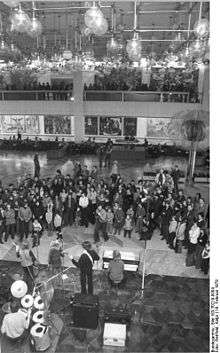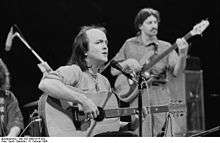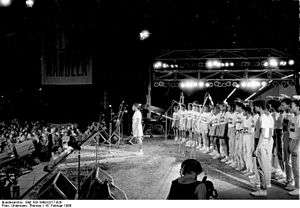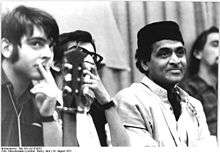Festival of Political Songs
| Festival of Political Songs German: Festival des politischen Liedes | |
|---|---|
|
1989 | |
| Genre | Rock, folk, political music |
| Dates | February |
| Location(s) | Berlin, East Germany |
| Years active | 1970-1990 |
| Founded by | Oktoberklub, Free German Youth |
The Festival of Political Songs (German: Festival des politischen Liedes) was one of the largest music events in East Germany, held between 1970 and 1990. After the collapse of East Germany, the festival lost its function and supporting infrastructure. In order to continue the tradition, a new festival, called the ZwischenWelt Festival, was held between 1991 and 1995.
History
It was founded by the group Oktoberklub and between 1970 and 1990 took place in East Berlin every February as an official event of the Free German Youth. The event was first organized by the Berlin division, but from 1975 was directed by the Central Committee of the Free German Youth.
Artists from 60 countries participated in the event over the years, and usually between 50 and 80 artists, from around 30 countries, performed, including prominent artists like Mikis Theodorakis, Miriam Makeba, Quilapayún, Inti-Illimani, Silvio Rodríguez, Mercedes Sosa, Gabino Palomares, Canzoniere delle Lame, and Pete Seeger accompanied by Chilean-exile and Berkeley based folk group Grupo Raiz. The mascot of the festival was a red sparrow named Oki (derived from Oktoberklub).
After the collapse of East Germany, the festival lost its function and supporting infrastructure. In order to continue the tradition, a new festival, called the ZwischenWelt Festival, was held between 1991 and 1995. Its supporting organization dissolved in 1995 because of financial difficulties.
Select appearances
- February 9–17, 1980: Agit-Prop (Finland), Ballada (Soviet Union), Tamás Berki (Hungary), Gruppe aus Kampuchea (Kampuchea), Macchina Maccheronica (Italy), Los Parra de Chile (Chile), Sands Family (Ireland), Daniel und Cédar Viglietti (Uruguay), Reinhold Andert, Gruppe Neue Musik, Brigade Feuerstein, Jahrgang 49, Liedehrlich (GDR), Franz Josef Degenhardt (BRD).

- February 8–15, 1981: José W. Armijo (El Salvador), Battlefield Band (Great Britain), Lajos Boros (Hungary), Maria Dimitriadi (Greece), Dosti (Afghanistan), Bjarne Jes Hansen (Denmark), Abdullah Ibrahim (South Africa), Los Jaivas (Chile), Bongi Makeba (South Africa), Dean Reed (USA), Schmetterlinge (Austria), Francesca Solleville (France), Chor Berliner Parteiveteranen „Ernst Busch“, Chor der EOS Kreuzschule, Gerhard Schöne, Wacholder (GDR), Floh de Cologne (BRD),Panorama ( USSR )
- February 14–21, 1982: Ad Hoc Singers (USA), bots (Netherlands), Chris Cutler (Great Britain), Illapu (Chile), Sigi Maron (Austria), Quinteto Tiempo (Argentina), Orkest de Volharding (Netherlands), Duo Voga/Turnowski (Hungary), Arbeiterfolk, Kurt Demmler, Gerhard Gundermann, Pietsch/Körbel, Hannes-Zerbe-Blechband (GDR), Liederjan, Hannes Wader (BRD), Hanns-Eisler-Chor (West Berlin).
- February 13–20, 1983: Willem Breuker Quartett (Netherlands), New York Street Theatre Caravan (USA), Cassiber (Great Britain/BRD), Patricio Manns (Chile), Letta M'Bulu (South Africa), Noel Nicola (Cuba), Oskorri (Spain), Mikis Theodorakis (Greece), Orchester der Musikhochschule Dresden, Jürgen Eger, Lin Jaldati, Silly, Jürgen Walter (GDR), Ina Deter, Duo Goebbels/Harth (BRD).
- February 12–19, 1984: Schanna Bitschewskaja (Soviet Union), Duck and Cover (Great Britain/BRD/USA), Khaled el Habr (Lebanon), Los Jaivas (Chile), Jackson Kaujeua (Namibia), Czesław Niemen (Poland), Ángel Parra (Chile), Mercedes Sosa (Argentina), Gabino Palomares (Mexico), Utamaduni (Tanzania), Erste Allgemeine Verunsicherung (Austria), Pialkowski/Rieck, Schicht, Wenzel & Mensching (GDR), Hannes Wader, Zupfgeigenhansel (BRD).
- February 10–17, 1985: René Bardet (Switzerland), Eric Bogle (Australia), Budka Suflera (Poland), Bruce Cockburn (Canada), Miriam Makeba (South Africa), San Francisco Mime Troupe (USA), Quilapayún (Chile), Silvio Rodríguez und Afro-Cuba (Cuba), Atahualpa Yupanqui (Argentina), Karls Enkel, Gina Pietsch, Rotdorn (GDR), Dieter Süverkrüp, Zupfgeigenhansel (BRD).
- February 16–23, 1986: Grupo Raiz/Osvaldo Torres (USA/France) Aroona (Australia), Amandla (South Africa), Francis Bebey (Cameroon), Billy Bragg (Great Britain), Cuarteto Cedrón (Argentina), Leon Rosselson (Great Britain), Pete Seeger (USA), Grupo Pueblo (Nicaragua), Pi de la Serra (Spain), Herman van Veen (Netherlands), Norbert Bischoff, Kerschowski, Pony (Canada), Pension Volkmann (GDR), Franz Josef Degenhardt (BRD) George Hewison (Canada).

- February 15–22, 1987: Attila the Stockbroker and The Neurotics (Great Britain), Red Music (Great Britain), Heber Bartolome (Philippines), Maria Dimitriadi (Greece), León Gieco (Argentina), Abdullah Ibrahim (South Africa), Maria del Mar Bonet (Spain), Luis Enrique Mejía Godoy (Nicaragua), Luci Murphy (USA), Mercedes Sosa (Argentina), Elżbieta Wojnowska (Poland), Gerhard Gundermann, Maike Nowak, Wenzel & Mensching (GDR), Dietrich Kittner (BRD).
- February 14–21, 1988: No Fixed Address (Australia), ANC-Ensemble (South Africa), Cassiber (Great Britain/BRD), Ewan MacColl/Peggy Seeger (Great Britain), Norma Gadea (Nicaragua), Sweet Honey in the Rock (USA), Tania Libertad (Peru), Carlos Mejía Godoy (Nicaragua), Moncada (Cuba), Amparo Ochoa (Mexico), Maria da Paz (Brazil), Erika Pluhar (Austria), Stella Chiweshe (Zimbabwe), Yarınistan (Turkey/BRD), Aufwind, Arno Schmidt, Gerhard Schöne, Duo Sonnenschirm, Sturmvögel (GDR), Wolf Brannasky (BRD), Johannes Hodek (West Berlin).
- February 12–19, 1989: Billy Bragg (Great Britain), Angelo Branduardi (Italy), Santiago Felíu (Cuba), Jugendensemble KDVR (Korea), Oyster Band (Great Britain), Michelle Shocked (USA), SWAPO-Kinderchor (Namibia), Daniel Viglietti (Uruguay), Gerhard Gundermann, Jams, Jalda Rebling, Arno Schmidt, Die Zöllner (GDR), Heinz Rudolf Kunze (BRD), Zwei Drittel (West Berlin) Chalk Circle (Canada).
- February 11–18, 1990: Inti-Illimani (Chile), The Klezmatics (USA), Mercedes Sosa (Argentina), Reinhold Andert, Norbert Bischoff & Gesellschaft, Gerhard Gundermann, Bolschewistische Kurkapelle, Oktoberklub (GDR), Duo Sonnenschirm (GDR) & Terem (Soviet Union), Ute Lemper, Konstantin Wecker (BRD), IG Blech (West Berlin), Fanfare van de Eerste Liefdesnacht, Amsterdam.
Gallery
See also
References
External links
 Media related to Festival of Political Songs at Wikimedia Commons
Media related to Festival of Political Songs at Wikimedia Commons




